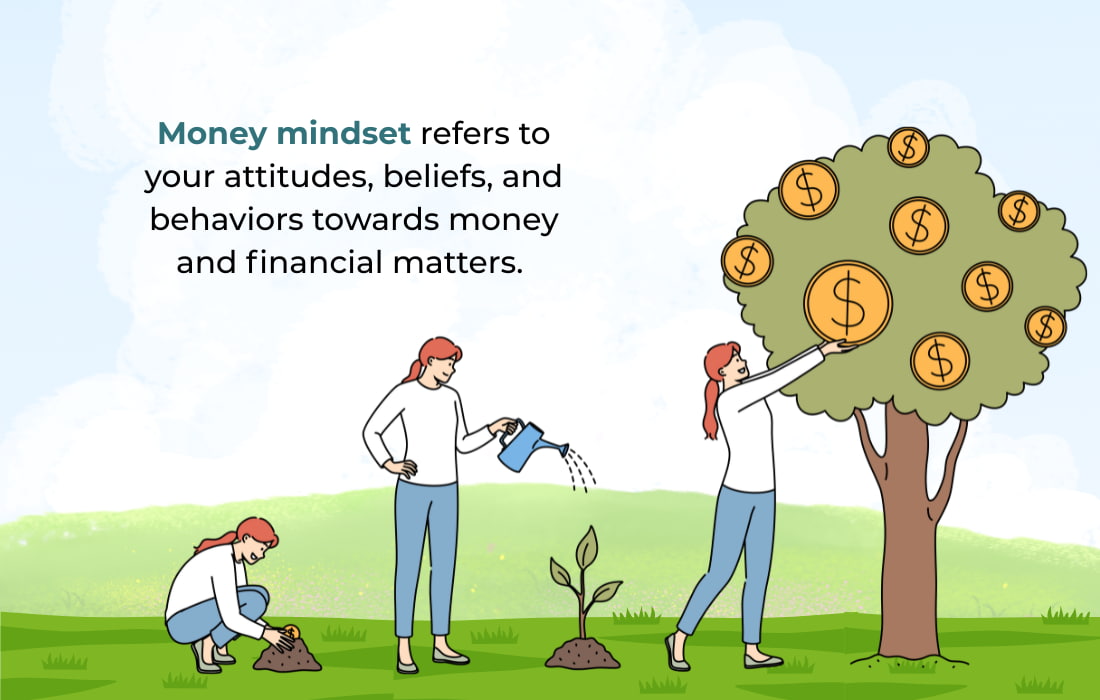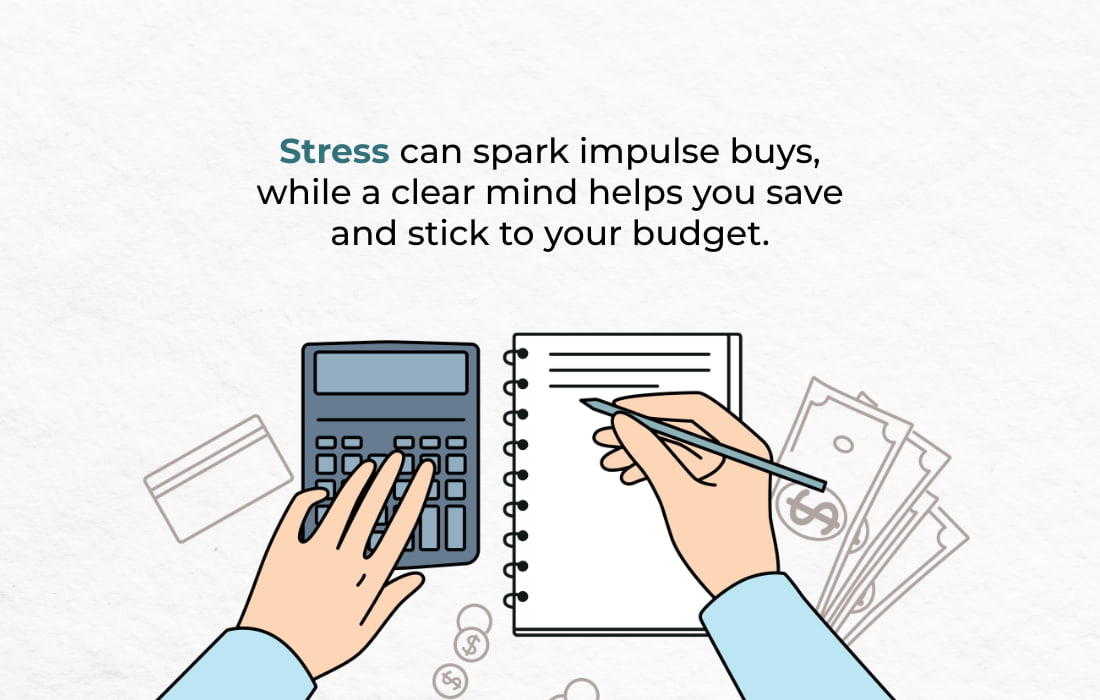What Is the Secret to Cracking Your Money Mindset?
My most important money mindset tip is to become aware of your limiting beliefs about money.
Most people are unaware of how their money mindset may be holding them back. They become firmly entrenched in their ways of thinking, often judging others who have achieved financial success while thinking that wanting more is bad.
The first step toward financial freedom is to understand your money mindset. Otherwise, no matter how hard you work or how much you wish for change, you will continue to fall into the same patterns.
A negative money mindset often closes the door to achieving true financial success. At the same time, cultivating a healthy money mindset and relationship with money allows you to be proactive in creating the future you desire, grounded in what matters most to you.
These are my top 12 money mindset tips that can help you on your path to financial freedom:
- Celebrate your financial progress even when your wins are small.
- Recognize the importance of your money mindset.
- Stop comparing yourself to others.
- Forgive your past financial mistakes.
- Let go of limiting money beliefs by identifying and replacing these beliefs.
- Set clear financial goals that are time-based and realistic.
- Form good financial habits such as saving and investing.
- Create a budget that brings you joy and doesn’t feel restrictive.
- Educate yourself about personal finance so you feel comfortable managing money.
- Be thankful and express gratitude regularly.
- Create affirmations to reinforce a positive money mindset.
- Try financial coaching to shape a positive money mindset.

Written By Tiffany Woodfield, Financial Coach, TEP®, CRPC®, CIM®
What Does Money Mindset Mean?
Money mindset refers to your attitudes, beliefs, and behaviors towards money and financial matters.
It influences how you approach saving, investing, and spending. Which ultimately affects your ability to create abundance in your life. With a positive money mindset, your beliefs align with your goals, empowering you to enhance your financial future.
In contrast, a negative money mindset fosters a scarcity mentality, leading to fears of loss and a belief that you are unworthy of wealth.
How I Changed My Money Mindset
I initially found changing my money mindset challenging and often questioned whether I was making any real progress.
To address this, I wrote down my negative money beliefs and assigned a percentage to how much I believed each one to be true. I also came up with a reframe for each of my limiting beliefs about money.
After a month, I revisited those percentages to assess any changes.
And guess what? They had changes!
This exercise was powerful because, as I focused on working through logical financial strategies, I began to notice significant mindset shifts. Eventually, I realized how unfounded my original limiting belief was that wanting more money was selfish.

12 Money Mindset Tips that Will Change Everything
1. Recognize the Importance of Your Money Mindset
Think of your financial future like building a house.
You might have big dreams for what you want your house to look like. Maybe you’d like a beach house with a beautiful garden, a stone path that leads up to a shiny front door, and a cool breeze that tickles your skin as you lie on the patio.
Amazing! But, no matter how beautiful the vision, you can’t build anything solid without a strong foundation. If you build your house on a foundation made of sand, it won’t hold up. The house will collapse before it’s even been built.
Your money mindset is like the foundation of your home.
If your money mindset is shaky, full of limiting beliefs, fear, or avoidance, your plans will always feel shaky, no matter how hard you work.
But when your mindset is grounded in clarity, confidence, and possibility, you give yourself the structure you need to create lasting financial success.
2. Realize That Comparing Yourself to Others Is a Losing Game
In today’s society, where social media and perfect images constantly bombard us, it can feel nearly impossible to stop comparing ourselves to others.
However, it’s crucial to recognize how damaging this habit can be. Comparing yourself to others is a losing game because you only see a fraction of the real story. Social media is just a parade of people’s best moments. We have no idea what’s really going on behind the scenes. In other words, it’s not even a fair comparison.
Instead of judging or feeling jealous, focus on your path.
Otherwise, you’ll be chasing dreams that aren’t actually real. So next time you catch yourself comparing, try cultivating curiosity: what makes that person who they are, and what might the rest of their story entail?
This shift in perspective can help you feel better about yourself and your journey.
3. Forgive Your Past Financial Mistakes
Everyone makes mistakes, and by continuing to punish yourself, you are holding yourself back from healing.
Forgiveness allows you to release these negative feelings so you can reflect on what went wrong. Then use those lessons to make better choices in the future.
4. Let Go of Limiting Money Beliefs
To proactively create the future you want, it’s crucial to let go of limiting money beliefs.
This is because when you view money as scarce or inherently bad, you inadvertently block opportunities for more abundance to flow into your life. Challenge each of these limiting beliefs by recognizing their impact on your financial well-being.
By adopting a mindset that views money as abundant and sees plenty to go around, you’ll feel less fearful. You will be empowered to take control of your financial situation and make confident decisions that align with your aspirations.

5. Set Clear Financial Goals
Do you remember writing to Santa as a kid, detailing exactly what you wanted for Christmas?
That clarity helped you visualize your desires. The same principle applies to financial goals: they need to be specific and well-defined for you to stay on track when creating the financial future you picture.
If you haven’t identified what you want (the way you did with your letter to Santa), then your chances of achieving it diminish. Setting clear financial goals gives you direction and purpose. It helps guide your decisions and actions along the way.
6. Form Good Financial Habits
Forming good financial habits is closely intertwined with your relationship with money.
By learning how to budget, save, and invest effectively, you equip yourself with the knowledge for financial success. Often, fear about money comes from a lack of understanding and experience, so you can address this by actively cultivating positive financial habits now.
Establishing routines that prioritize financial literacy will not only boost your confidence but also set a strong foundation for achieving your long-term financial goals.
Some good financial habits include:
- Set a weekly money check-in: Spend 15 minutes every Sunday reviewing your expenses and updating your budget.
- Automate your savings: Set up an automatic transfer to a savings account every payday—even if it’s just $25.
- Use a budgeting app: Tools like YNAB, Mint, or PocketGuard make it easy to track where your money goes.
- Learn one new thing about money week: Read a personal finance article or listen to a money podcast to build financial literacy over time.
7. Create a Budget That Brings You Joy
You might be wondering, “How can a budget bring me joy? Isn’t it a tool to limit my spending?”
This perspective is where many people go wrong. A simple budget helps you understand where your money goes, giving you a sense of control over your finances.
The result is you get to make conscious choices about your spending, including those “frivolous” purchases that might spark guilt. Imagine being able to indulge guilt-free, knowing that your budget supports your values and desires, now that’s a motivating thought!
Remember to spend money on the things you care about and cut costs in the areas that really don’t matter to you. That’s how a budget can bring you joy.
8. Educate Yourself About Personal Finance
Educating yourself about personal finance can be an empowering journey that can lead to greater financial security and confidence.
Rather than fearing the stock market or retirement planning, you’ll be able to make informed decisions that minimize stress. Remember, the more you learn, the better prepared you’ll be to navigate your financial future successfully.

9. Be Thankful and Express Gratitude Regularly
Expressing gratitude for what you already have in your life sends a clear message about what you want more of.
Consider gratitude like picking up the phone and placing an order for your desires. It not only fills you with joy about your current blessings but also communicates your intentions for the future.
This practice allows you to recognize and appreciate the wealth already present in your life. Expressing gratitude shifts your focus from what you lack to what you cherish, paving the way for more positivity and abundance to flow into your life.
10. Create Affirmations to Reinforce a Positive Money Mindset
Once you’ve identified limiting beliefs about money, the next step is to create positive affirmations that challenge those beliefs.
Ensure these positive money affirmations resonate with you and reflect your desires for financial freedom. To make them more effective, consider writing them down on sticky notes and placing them in visible spots, such as your wallet or bathroom mirror.
Repeating these affirmations regularly can help reinforce a positive money mindset and transform your relationship with wealth over time.
11. Try Financial Coaching to Shape a Positive Money Mindset
If you’re serious about shaping your financial perspective, working with a financial coach can be incredibly beneficial.
They can help you reprogram negative beliefs and cultivate a positive money mindset. With their guidance, you’ll be better equipped to navigate your financial challenges and expedite your journey toward success.
Remember, nurturing a positive money mindset is essential for achieving financial freedom and creating the life you desire.

12. Celebrate Your Financial Progress
Celebrating your financial progress is vital to staying motivated and on track.
To do this, create long-term financial goals alongside short-term milestones that allow you to celebrate achievements along the way. Be grateful for the successes you’ve already experienced and excited for what lies ahead.
Quick Video: 3 Steps to Manifest Money (Or Anything Else)
You can use these three simple steps to manifest money or anything else! Make sure you click the subscribe button if you’re YouTube user so you get more of these videos in your feed.
Common Questions About Money Mindset
How do I develop a mindset of abundance?
To develop a mindset of abundance, it’s crucial to first recognize and confront your scarcity mindset.
Begin by listing all the negative beliefs you hold about money and your ability to create wealth.
For each negative belief, challenge its validity by writing down reasons why it isn’t true, and then craft a positive statement to counter it. If you struggle to find positive statements for yourself, look for examples of abundance in the lives of those around you.
By consistently addressing each negative belief with a positive affirmation, you’ll gradually shift your mindset from scarcity to abundance, enabling you to see new opportunities and embrace a more fulfilling financial outlook.
What are the benefits of having a mindset of abundance?
Having a mindset of abundance brings numerous benefits that can transform how you approach life and your finances.
It empowers you to take control of your circumstances, fostering a sense of agency and confidence. With this mindset, you’re more willing to take risks to improve your situation, as you believe that positive outcomes are possible.
Suddenly, you find yourself noticing opportunities that previously went unseen, as your perspective shifts toward abundance rather than limitation.
How can I shift from a scarcity mindset to an abundance mindset?
To shift your mindset from scarcity to abundance, start by listing your negative beliefs and examining how you can view them differently.
For instance, if you think, “I will never have enough,” challenge this thought by asking yourself, “How can I have enough?”
Consider whether this belief is 100% true and brainstorm actionable steps to change that perspective. By cultivating curiosity around your beliefs, you can gradually reframe your mindset toward abundance.
How can I build better money habits?
Building better money habits begins with a thorough understanding of your current financial situation.
Take the time to analyze your spending habits and recognize areas where you might be spending on things that don’t truly add value to your life. Once you have this clarity, you can educate yourself on budgeting, saving, and investing strategies.
Ultimately, your desire to learn and improve your financial habits is the first critical step toward building a healthier money management approach.

How does negative self-talk affect my money decisions?
Negative self-talk creates fear and diminishes self-confidence, which can severely limit your ability to make financial decisions.
This self-doubt may result in missed opportunities for investing or saving, as you might hesitate to take calculated risks. Additionally, negative self-talk can lead you to question your ability to manage money effectively, reinforcing a cycle of anxiety around your finances.
How do I know when it’s okay to spend money?
You can gauge when it’s okay to spend money by first understanding your overall financial picture.
Creating a budget that details your income and expenses each month is crucial. Once you have a clear view of your finances, you can allocate funds for discretionary spending, ensuring that your spending aligns with your financial goals.
This approach allows you to enjoy what you want while still maintaining financial responsibility.
What are some easy ways to start saving money?
First, to start saving, you need to understand how much comes in and how much goes out each month.
Then you can set up automatic transfers where a set amount comes off your earnings towards a separate savings account.
You can also reduce expenses by looking at how many “holes” you have in your bucket. This is where money goes out each month towards things you don’t need and didn’t realize you were spending on.
How does my mental health impact my money choices?
Have you ever had a day when you were feeling tired and blue?
Nothing seems to be going your way, and it all just feels like a grind? Then you see a “shiny object” and make the impulse purchase only to realize you still feel the same the next day? That is one common way your mental health can impact your money choices.
Stress often leads to impulsive spending as a coping mechanism or avoidance of confronting financial issues. When you have good mental health, it promotes better decision-making, helping you stick to budgets and saving plans.

Get the Free Guide and Audio Meditation for Manifesting Your Dreams
Pop your email address in the form below to get my easy checklist and guide to manifesting and the guided audio meditation to help you get started.
You’ll also get one or two emails per month with the latest blog posts about abundance, wealth-building, manifesting, and creating a fulfilling life.
Read More:
💎 How to Attract an Abundance of Money: Mindset Shifts and Affirmations that Work
💎 5 Ways to Attract Money and Live More Abundantly
💎 12 Big Money Blocks Even the Rich Have and How to Reverse Them
About the Author

TIFFANY WOODFIELD is a financial coach, cross-border expert, and the co-founder of SWAN Wealth based out of Kelowna, BC. As a TEP and associate portfolio manager, Tiffany has extensive experience working with successful professionals who want to leave a legacy and enjoy an adventurous, work-optional lifestyle. Tiffany combines extensive knowledge from her background as a financial professional with coaching and her passion for personal development to help her clients create a unique path that allows them to live their fullest potential. Tiffany has been a regular contributor to Bloomberg TV and has been interviewed by national and international publications, including the Globe and Mail and Barron’s.